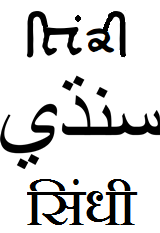Language/Sindhi/Grammar/Pronouns
Hi Sindhi learners! 😊
In this lesson, we will learn about pronouns in Sindhi grammar. Pronouns are used as a substitute for a noun. For instance, instead of saying "Nathan went to the store," you can say "He went to the store."
Pronouns are essential in any language, and by learning how to use them properly, you can convey your message more efficiently. After this lesson, you will be able to use Sindhi pronouns correctly and engage in more complex communication.
Don't miss the chance to check out these pages as you wrap up this lesson: How to Use "Be", Future Tense, Negation & Adjectives.
Personal Pronouns[edit | edit source]
Personal pronouns are used to refer to individuals or groups of people. They are inflected for the person, gender, and number. Sindhi personal pronouns are often employed with postpositions and other elements that reflect the case, like the nominative, genitive, dative, accusative, and adverbial cases.
Here is a table with Sindhi personal pronouns:
| Sindhi | Pronunciation | English |
|---|---|---|
| مون | mun | I (singular male) |
| منهن | munhun | I (singular female) |
| ۾و | muhu | you (singular male) |
| ۾ | muhun | you (singular female) |
| آهي | ahi | he, she, it |
| ۾نھون | muhnun | we (inclusive) |
| ۾زن | muzun | we (exclusive) |
| ۾نهن | muniun | you (plural) |
| ۾هن | muhin | they |
Examples[edit | edit source]
- Person 1: مون جون مالڪ آهي. (mun joon malik ahi) (I am the owner.)
- Person 2: ۾و ماڻهون جي ڪري (muhu munnhoon je karee) (You are doing his work.)
Possessive Pronouns[edit | edit source]
Possessive pronouns are utilized to demonstrate ownership of an object or subject. Sindhi possessive pronouns come following the noun they refer to and follow the gender and number of that noun.
Here is a table with Sindhi possessive pronouns:
| Sindhi | Pronunciation | English |
|---|---|---|
| منهنجو | munhunjo | my |
| توهانجو | tohunjho | your |
| جيڪو | jeeko | his, her, its |
| آهنجو | ahunjo | our (inclusive) |
| آپنجو | aapunjo | our (exclusive) |
| تاهنجو | taahinjo | your (plural) |
| جينھونجو | jinhhunjo | their |
Examples[edit | edit source]
- Person 1: منهنجو چراغ. (munhunjo charagh) (My lamp.)
- Person 2: توهانجي کتاب. (tohunji kitab) (Your book.)
Reflexive Pronouns[edit | edit source]
In Sindhi grammar, reflexive pronouns are used when the subject and the object are the same. Translated to English, we often use "-self" or "-selves." Sindhi reflexive pronouns are formed by adding the suffix "-جي" ("-je") to the end of the possessive pronoun.
Here is a table with Sindhi reflexive pronouns:
| Sindhi | Pronunciation | English |
|---|---|---|
| مونجي | munji | myself |
| توهانجي | tohunji | yourself |
| جيڪي | jejiki | himself, herself, itself |
| آهنجي | ahunji | ourselves (inclusive) |
| آپنجي | aapunji | ourselves (exclusive) |
| تاهنجي | taahinji | yourselves |
| جينھونجي | jinhhunji | themselves |
Examples[edit | edit source]
- Person 1: مونجي کمپيوٽر سٺو. (munji computer satho) (I do it with my computer.)
- Person 2: جيڪي سڄو. (jejiki sachho) (He did it himself.)
Interrogative Pronouns[edit | edit source]
Interrogative pronouns are used when asking questions. These pronouns direct attention to an undefined noun or noun phrase. Sindhi interrogative pronouns can be used to ask for any type of information.
Here is a table with Sindhi interrogative pronouns:
| Sindhi | Pronunciation | English |
|---|---|---|
| ڇا | chaa | what |
| ڪيا | kia | which |
| ڪي | ki | who |
| ڪـ | ko | whom |
| ڪـنهن | kuniun | whose |
| چـڇو | chojo | how |
Examples[edit | edit source]
- Person 1: چـڇو ڏنلو؟ (chojo danlo?) (How to give?)
- Person 2: ڪـنهن کٺي نه ائونديو؟ (kuniun kithe na aundiyo?) (Whose home is not here?)
Demonstrative Pronouns[edit | edit source]
Demonstrative pronouns are used to show and point at specific nouns or noun phrases. Sindhi demonstrative pronouns can show the distance of the noun. There are three types: proximal (in close proximity), medial (in the middle), and distal (far away).
Here is a table with Sindhi demonstrative pronouns:
| Sindhi | Pronunciation | English |
|---|---|---|
| هاڻ | han | this (proximal) |
| هن | hun | that (medial) |
| اهي | ahi | that (distal) |
Examples[edit | edit source]
- Person 1: هاڻ وڏ سڀز. (han wad sabbaz) (This is a large garden.)
- Person 2: هن ڪتاب ٻڌا (hun kitab chhada) (That book is old.)
To improve your Sindhi Grammar, you can also use the Polyglot Club website. Find native speakers and ask them any questions!
➡ If you have any questions, please ask them in the comments section below.
➡ Feel free to edit this wiki page if you think it can be improved. 😎
Sources[edit | edit source]
Videos[edit | edit source]
Pronoun | Sindhi Grammar | Kinds of Pronoun - YouTube[edit | edit source]
Sindhi Grammar Pronoun lesson 3 ضمير || Sindhi Alphabet|| Sindhi ...[edit | edit source]
Use of Personal Pronouns in English | English in Sindhi - YouTube[edit | edit source]
Other Lessons[edit | edit source]
- Questions
- Conditional Mood
- How to Use Be
- Negation
- How to Use Have
- Future Tense
- Plurals
- Adjectives
- Give your Opinion

